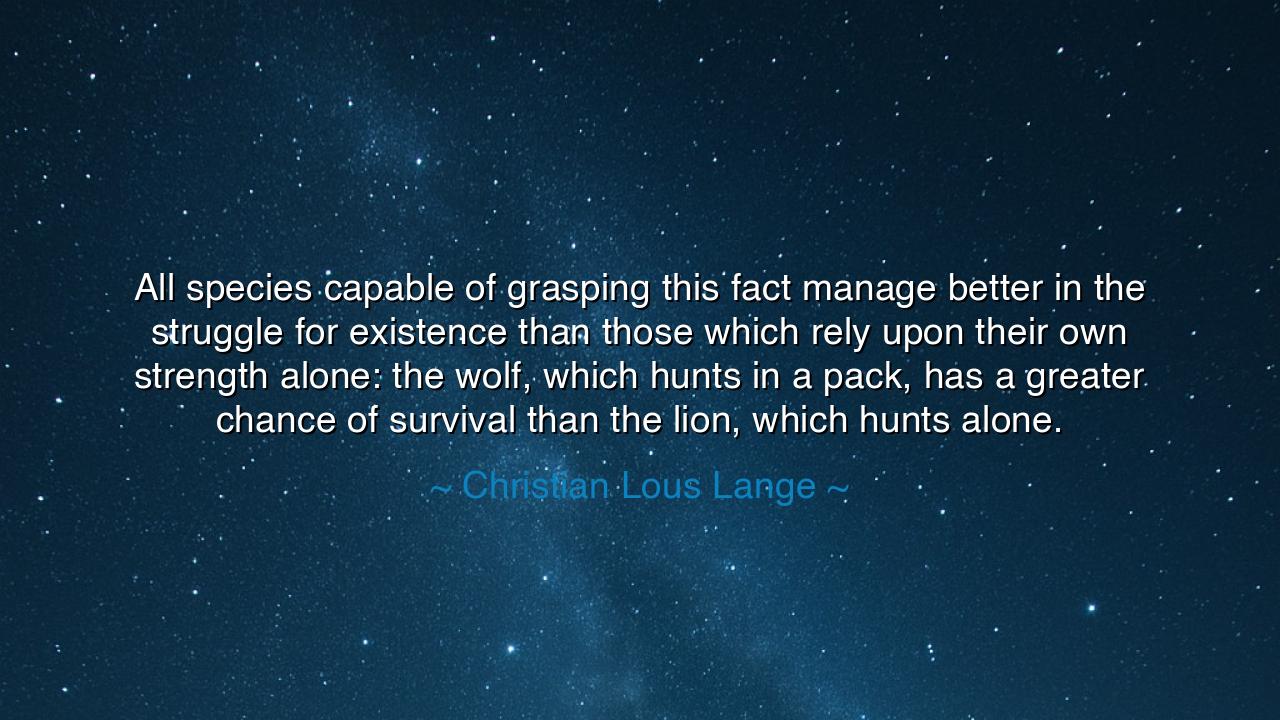
All species capable of grasping this fact manage better in the
All species capable of grasping this fact manage better in the struggle for existence than those which rely upon their own strength alone: the wolf, which hunts in a pack, has a greater chance of survival than the lion, which hunts alone.






Host: The forest breathed in mist and cold, its trees standing like ancient witnesses beneath a sky the color of steel. It was dawn, that strange, trembling hour when night still clings, but the world has already begun to wake. A campfire smoldered at the edge of a clearing, its embers glowing faintly, fighting the bite of the air.
Host: Jack sat beside it, wrapped in a heavy coat, a thermos of coffee in his hands, eyes fixed on the rising light. Across from him, Jeeny emerged from a tent, hair messy, face pale but peaceful, a book clutched in her hands.
Jeeny: “Listen to this,” she said, her voice soft, cutting through the chill. “‘All species capable of grasping this fact manage better in the struggle for existence than those which rely upon their own strength alone: the wolf, which hunts in a pack, has a greater chance of survival than the lion, which hunts alone.’ — Christian Lous Lange.”
Host: The wind shifted, carrying the smell of smoke and pine. A crow called somewhere above, its cry sharp, lonely, echoing through the trees.
Jack: (grinning faintly) “So, what are you saying? That I should start howling instead of thinking?”
Jeeny: (smiling) “Maybe just listening, for once. It’s about cooperation, Jack. About how strength means nothing if it isn’t shared.”
Jack: “Or maybe it’s about how dependency makes you weak. The lion might hunt alone, but at least he doesn’t have to wait for anyone to move.”
Host: The fire crackled, sparks lifting like tiny stars into the pale light.
Jeeny: “And when the lion falls, who lifts him up?”
Jack: “No one. That’s the point. He dies the way he lives — alone, but uncompromised.”
Jeeny: (frowning slightly) “Uncompromised? Or just afraid to trust?”
Host: Jack’s jaw tightened, his breath visible in the cold. For a moment, he didn’t answer. His eyes wandered toward the forest — to the shadows, to the movement of something unseen.
Jack: “You ever notice how the strongest people are always the loneliest ones? The inventors, the soldiers, the leaders — they stand apart because they have to. You can’t see beyond the horizon if you’re buried in a crowd.”
Jeeny: “Maybe. But you can’t reach it alone either. You need hands to build the bridge. You need voices to guide the way. Even wolves, Jack — they sing together, not apart.”
Host: The morning light grew, painting the trees with gold. The mist began to lift, revealing the world — not empty, but woven. The forest was alive with movement — the rustle of leaves, the soft padding of creatures that moved as one.
Jack: “That sounds beautiful, sure. But the real world isn’t a forest full of wolves. It’s a market, a battlefield, a boardroom. People don’t survive by singing in packs, Jeeny. They survive by climbing higher — by outlasting everyone else.”
Jeeny: (sitting down beside him) “And what happens when you get to the top, and there’s no one left to speak your language? You call that survival, Jack?”
Jack: “It’s victory.”
Jeeny: “No — it’s exile.”
Host: The word hung in the air, slow, heavy, true. Jack shifted, his gaze lowering. The fire popped, a spark landing near his boot and dying instantly.
Jeeny: “Think of humanity, Jack. Every great thing we’ve ever built — civilization, art, language, even the internet — all of it depends on our need to connect. If the lion is king, the wolf is a people. That’s why they endure.”
Jack: “And yet, it’s the lion people admire. No one writes poems about wolves.”
Jeeny: (gently) “That’s because they’re too busy howling to care.”
Host: The sun broke through the trees, spilling a golden wave across the clearing. Jack watched the light crawl across Jeeny’s face — her eyes soft, resolute, alive.
Jack: “So you think survival is about togetherness?”
Jeeny: “No. It’s about balance. Knowing when to stand alone and when to lean on others. The wolf doesn’t lose his instinct by joining the pack — he amplifies it.”
Jack: (quietly) “And the lion?”
Jeeny: “The lion becomes a legend, not a legacy.”
Host: The forest seemed to listen, its leaves stirring, as if approving. The wind shifted, soft, carrying the echo of distant howls — not menacing, but ancient, mournful, true.
Jack: “You make it sound like we’re supposed to choose — freedom or belonging.”
Jeeny: “No. We’re supposed to remember that freedom means nothing if no one’s waiting for you to come back.”
Host: Jack fell silent. The fire flickered, the smoke rising into the sky like a signal — fragile, but seen. He watched it twist, disappear, and for the first time, his shoulders lowered, as if something within had finally eased.
Jack: “You know,” he said, half-smiling, “I used to think I was the lion. Independent, strong, untouchable. But maybe I’ve just been a wolf who forgot how to call for the others.”
Jeeny: “Then remember. It’s not too late. We all forget sometimes — that our strength isn’t in how loud we roar, but in how deeply we echo.”
Host: The camera would pull back now — the two of them seated by the fire, small against the immensity of the woods, but not alone. The light of morning spread, gentle, forgiving, and the forest stirred with life once more.
Host: And in that vast, breathing world, one truth lingered, unspoken, but understood — that the strongest hearts are not those that stand alone, but those that learn to beat in unison.






AAdministratorAdministrator
Welcome, honored guests. Please leave a comment, we will respond soon